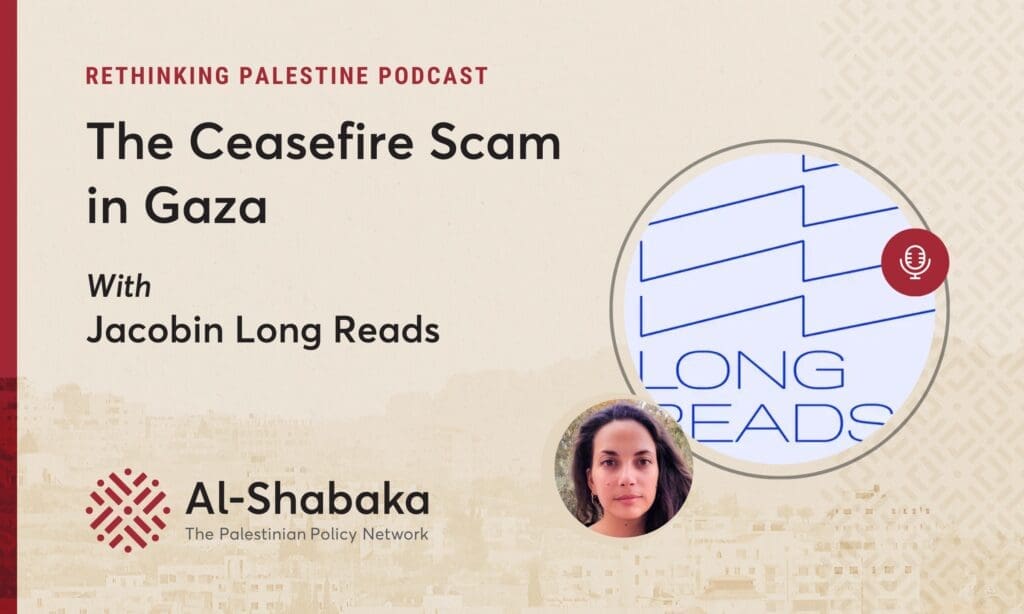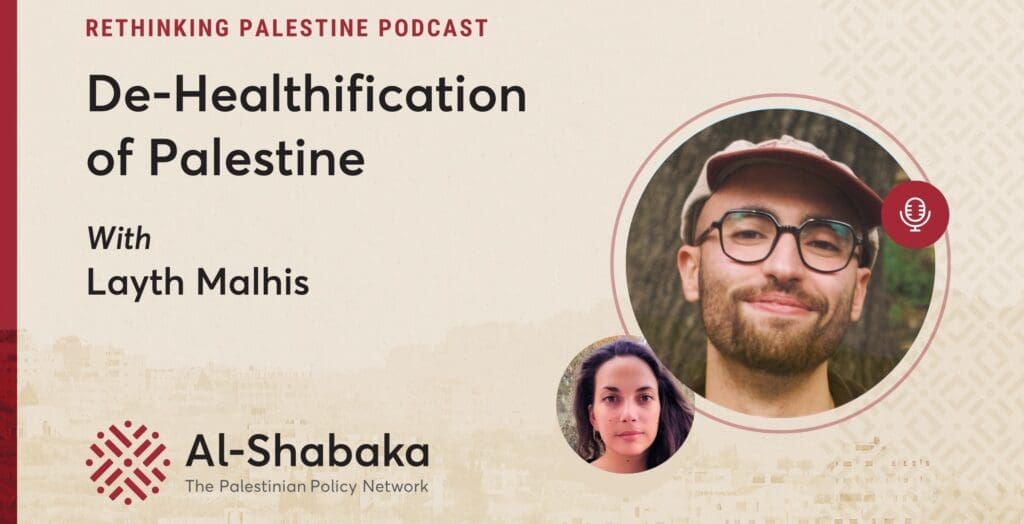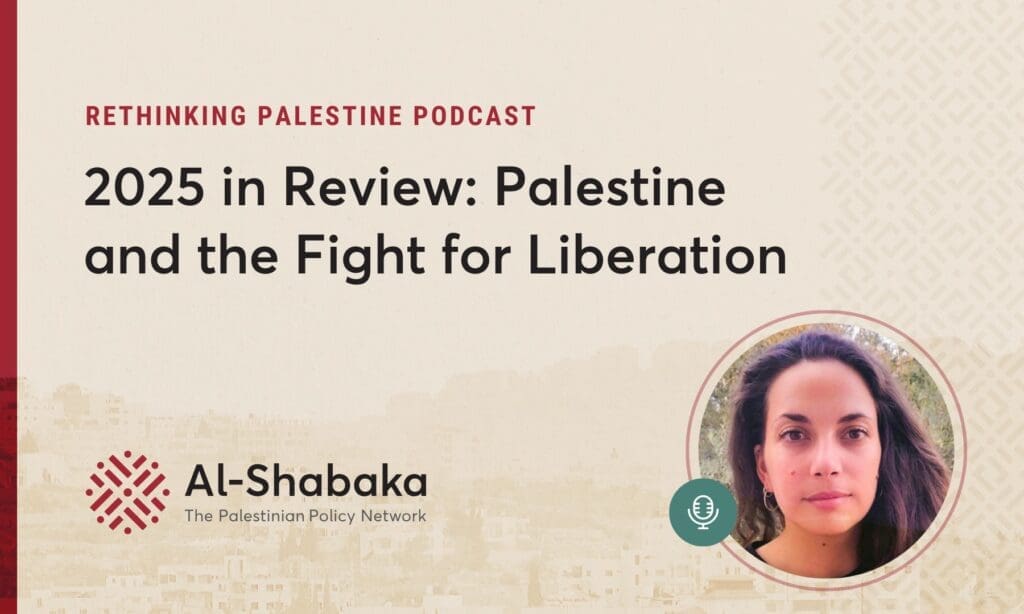About This Episode
Episode Transcript
The transcript below has been lightly edited for brevity and clarity.
Fathi Nimer 0:00
The plans for the West Bank can’t be seen in separation from the plans of the Gaza Strip. Even from the beginning of the war, people were talking about pushing the Palestinians of Gaza out into Sinai and re-establishing settlements again. This is not different at all from what’s happening in the West Bank and what they are planning for the West Bank, or what they would like to happen in the West Bank — expanding more settlements and kicking out more Palestinians. This is all part of the same struggle. It’s part of the same colonization effort.
Yara Hawari 0:31
From Al-Shabaka, the Palestinian Policy Network, I am Yara Hawari, and this is Rethinking Palestine.
Since the assault on Gaza, which began in October 2023, tens of thousands of Palestinians have been killed, injured, or are missing, likely buried under the rubble of their own homes or shelters. Nearly two million Palestinians in Gaza have been displaced, with cold, thirst, and hunger ravaging the entire population.
While the world deliberates on the technicalities of genocide, Israeli colonization of the West Bank and disruption to Palestinian life has only accelerated.
Joining me in this episode is Fathi Nimer, Al-Shabaka’s Palestine Policy Fellow. Fathi, thank you for joining me on Rethinking Palestine.
Fathi Nimer 1:22
Thank you for having me, Yara.
Yara Hawari 1:23
So, Fathi, perhaps you can tell us a little bit about what the Israeli regime is doing on the ground in the West Bank at the moment.
Fathi Nimer 1:30
The Israeli regime has been going on an absolutely barbaric rampage in the West Bank. From the side of military raids and arrests, we’re talking about almost 400 Palestinians who have been killed in the West Bank since the 7th of October, and thousands have been injured. They seem to be taking out their frustrations on Palestinians for the events in Gaza and shooting anyone for any reason. I mean, in the early stages of the war, we heard terrifying stories about the torture of Palestinians, humiliation, and even urinating on them.
Of course, before October 7th, there were minimal or no consequences to such behavior, but now it seems normalized as a way of revenge against Palestinians. The settlers have also been going on a rampage. They seem to be emboldened now to go out and do whatever they want. They have been armed by the government — thousands of assault rifles were distributed to them. So they now feel that they have the backing of everybody to just go out and do whatever they want. They’ve been burning down orchards and threatening Palestinians.
The number of Palestinians arrested has skyrocketed — we’re talking about almost 6,000 in the last four months alone. Palestinian laborers inside the Israeli labor market have been banned from entry because all of their permits have been revoked. There have been some sanctions on the Palestinian Authority by way of withholding the tax revenues, which is supposedly a right of the Palestinian Authority to collect from Israel. And this has also shut down transportation. There are difficulties exporting and importing, and people just getting to work or trying to access universities — just moving between areas — has been very difficult.
So this is, in general, some of the biggest actions taken by the Israeli occupation since October 7th in the West Bank.
And of course that difficulty in movement is because of the extra roadblocks and checkpoints that the Israeli army has set up across the West Bank. I read somewhere that there are now more checkpoints than there were during the Second Intifada. The closure of the West Bank has been really extreme. Before October, we had villages, for example, in the southeast Nablus area that had their main entrances forced shut so that Palestinian traffic is segregated from settler traffic. But today, even routes that are usually open have been completely sealed, and new checkpoints have been introduced in areas where they had never existed before.
Like you said, even before the Second Intifada. So a routine 30-minute drive could take up to an hour and a half now, depending on where you’re going. And this has been very noticeable in the villages around Ramallah as well.
Yara Hawari 4:04
And now Fathi, you mentioned the withholding of Palestinian tax revenue by the Israeli regime.
It’s worth mentioning for our listeners that under the Paris Protocol — which was a sort of economic annex of the Oslo Accords in 1994 — the protocol stipulated that the Israeli regime would collect the tax revenues on behalf of the PA until it achieved statehood. And the Israeli regime has systematically used that as leverage to collectively punish the PA and collectively punish Palestinians.
And so again, we see that being used in the West Bank, but also for public servants in Gaza. So many Palestinians who work in the public sector are actually not getting their full salaries. And I think it was estimated that the Israeli regime is withholding around $188 million a month, which accounts for about 64 percent of the PA’s total revenue.
Fathi Nimer 5:05
I think things like this — the economic angle, the bureaucratic angle — usually get left behind, understandably, because of the genocide going on in Gaza and the deaths and killings going on in the West Bank. But this is the systemic effect of the occupation, how it operates. It’s also very violent and very colonial.
The design of the economy of the West Bank from day one has been designed in a way that could be held hostage by Israel at the drop of a hat. And this is what they really succeeded with. Now we have about 170,000 laborers who have been cut off from their income. We have PA workers — around 140,000 between the civilian and security sectors — who depend on these tax revenues to be paid their salaries. We’re talking about hundreds of thousands of people having their income either cut or disrupted. Difficulties exporting or importing mean that companies simply can’t function as normal, and even if they could, the indirect damage is that people simply have less money to spend. So nobody has really remained unaffected by the economic aspects of these measures taken by Israel.
And this is not the first time, of course, that this has happened. Whenever something happens that Israel is unhappy about, they withhold the tax revenues. We saw this during the Second Intifada — they did it quite frequently, and it would not be uncommon for people to go months without any kind of income.
Yara Hawari 6:31
So Fathi, we’re seeing a severe economic impact, increased military raids, mass incarceration, and extrajudicial assassinations.
Why is all of this going under the radar? Why is this not being reported on by the mainstream media?
Fathi Nimer 6:51
It’s understandable in a way. The genocide currently being carried out against Gaza is on such a monstrous scale, with so many stories of cruelty and mass murder, and the unfiltered imagery that’s coming out of it — this is one of the most documented genocides when it comes to social media, and it’s impossible for that not to take precedence over what’s going on here in the West Bank.
So this is part of the reason why Israelis — settlers, army, all the components of their society — thought it would be a golden opportunity to go out and just do whatever they want. Settlers in particular have really been exploiting this moment, now that they’re much more emboldened with their more open support from the state. They’ve been going out and expelling Palestinians from their communities. We’re talking about entire Bedouin communities that no longer exist, especially in the Hebron area. They go, they burn their crops, they kill their livestock, and they tell them if they don’t leave, their entire family is going to be killed. And this has been the case — we have over a thousand people that have been expelled from over 13 communities in the southern West Bank, with threats of a second Nakba, or a “Great Nakba.”
This has become routine from the settlers — from a society that usually denies the Nakba, but now it’s something to be called for and cherished and galvanized around. So I really think that the genocide happening in Gaza is being used as cover by these settlers and the army to do whatever they want in the West Bank with much less scrutiny than usual. Usually there isn’t that much scrutiny to begin with, but now they think they can get away with really anything they want to do. None of these plans are really new, but this is the timing they chose because they think people are less likely to notice.
Yara Hawari 8:44
Of course, the devastation in Gaza is ongoing and so, so horrific. It makes sense that reporting on that would take precedence. But I do think, especially in the mainstream Western media, that there is a more insidious aspect to this. I think it’s about isolating Gaza from the rest of Palestine. It’s about framing this as a war between Hamas and Israel rather than an acceleration in the ethnic cleansing of Palestine.
That’s why there is limited reporting on what’s happening in the West Bank — because it’s a kind of compartmentalization, a dividing of Palestine, to separate Gaza and make it seem like an isolated issue rather than the core of the Palestinian struggle.
Fathi Nimer 9:31
I agree. I think the compartmentalization of Palestine and its different regions is a very serious issue, and it is employed in such a manner. The plans for the West Bank can’t be seen in separation from the plans of the Gaza Strip. Even from the beginning of the war, people were talking about pushing the Palestinians of Gaza out into Sinai and re-establishing settlements again. This is not different at all from what’s happening in the West Bank and what they are planning for the West Bank — expanding more settlements, kicking out more Palestinians. This is all part of the same struggle. It’s part of the same colonization effort.
We can’t look at it separately from what’s going on even in Jerusalem, or even within the 1948 territories. It’s all connected. And I think one of the biggest successes of the occupation of 1967 is that it’s really tried to reinforce this kind of segmentation of Palestinian society and to make it seem like a fact of life and a natural part of things, rather than something imposed on us very recently.
Yara Hawari 10:40
If you’re enjoying this podcast, please visit our website al-shabaka.org where you will find more Palestinian policy analysis and where you can join our mailing list and donate to support our work.
So Fathi, what has been the global policy reaction to what is unfolding in the West Bank?
Fathi Nimer 11:00
When it comes to Gaza, we haven’t seen anything concrete — we have the usual calls to respect human rights, and if something is really bad, they say they’re “concerned about the human rights situation.” But when it comes to the West Bank, it feels like they’re a little bit more brave to talk about the situation. Relatively speaking it’s not great, but they feel like they can talk about it a bit more because it can’t be seen as support for Hamas, but rather for the Palestinian Authority, which has been doing its best to remain in the good graces of its benefactors.
When it comes to the West Bank, it’s easy to say, “oh, these are just radical fringe settlers, treat them as isolated incidents,” and to absolutely ignore how they cannot exist without government support and resources. And of course, do not criticize the official “military action” carried out by the occupation forces. So I think very little has been done.
But recently, we heard about Biden’s step to sanction settlers. He made it crystal clear he refuses to put any red lines on Israel in Gaza. So to try and appease, in my view, some of his Muslim or Arab base in the US during the election season, I think he tried to throw people a bone. He said he’s going to sanction extremist settlers who attack Palestinians. And all of that ended up being four people.
I don’t really think that this is a very meaningful step — the practicalities of it are completely unclear. Are they going to use Israeli police data? Because that will never happen, they aren’t going to cooperate. Are they going to use Palestinian testimonies? I don’t think they’re going to rely on that either. It just seems like a very weak step, trying to appear like they’re doing something when they’re absolutely not doing anything in Gaza — other than supporting the genocide.
If he wanted to make any real statement, he would have sanctioned all settlers as a whole. That would have been more impactful. But again, I don’t think the actual goal is to pressure Israel — I think it’s just to try to salvage some of his image after his open support for the Gaza genocide.
Of course, the Israelis are making a big deal out of it, making it seem much more significant than it actually is. But this is generally how Israel acts — even someone like Obama, who signed one of the biggest military support packages in history, was called anti-Israel because one time he criticized Israel without actually doing any follow-up or taking any action. But this is how it usually goes.
Yara Hawari 13:38
So, Fathi, let’s switch gears a bit and focus on the Palestinian Authority and its response to the ongoing genocide in Gaza.
Fathi Nimer 13:47
Well, the Palestinian Authority has basically been acting almost like a neutral third country. It claims that it’s doing diplomatic work behind the scenes, but I really take that claim with a grain of salt. And even so, if that’s the entirety of its reaction, it’s completely inadequate in the current moment.
And I wish it were only relegated to that. It’s actually killed four Palestinians for protesting against it during the genocide. People were out in the street in what started as a protest in support of Gaza, and then it became an anti-PA protest — as it usually does — because people saw the PA was basically doing nothing. It was repressed quite harshly, as is the habit of the PA, and around four Palestinians have been killed.
It doesn’t just stop there. There are reports that the PA has actually instructed its schools — the official government schools — not to mention anything about Gaza since October, or anything having to do with resistance. They’re absolutely terrified of being seen in any way as being in collusion with or in support of Hamas or the Palestinians in Gaza.
And I think they’re really in a tough position because their project is kind of falling apart. Palestinian youth, for example, overwhelmingly see the PA as this corrupt subcontractor for the occupation. They’ve lived their entire lives under this paradigm of two states and Oslo, but they have not seen anything really from it. This magical state they’ve been hearing about since they were born is no more real today than it was a decade or two ago. So the PA has nothing to show for itself.
And any kind of victory for Hamas in Gaza — such as, let’s say, the release of prisoners, even if it’s not all of them, or even a symbolic victory — is a huge blow to their two-state project, which for most people living today has not produced anything tangible in the past two decades. It’s just all talk to them. So I feel like, while they outright can’t say in public that they hope Hamas loses, I imagine that’s the general sentiment there. And I feel like people understand this and sense this, and it’s never been more obvious that the PA has become a subcontractor for the occupation — in a way that isn’t even under the table anymore, the way it used to be at least.
Yara Hawari 16:09
Fathi, what about discussions about the PA taking over Gaza?
I know that’s something the Americans are very keen on and have been in talks with the PA about. And of course, as we’re talking, the genocide is ongoing — we’re not even in a post stage. This is still an active genocide. And rather remarkably, people are talking about the “day after” even while the bombs are still falling on our kin in Gaza. But those discussions are happening between the PA and various different actors. What are your thoughts on that?
Fathi Nimer 16:55
As you said, I think all talk about the day after is not only premature — a lot of it is almost delusional, because they’re plotting for something they don’t even know how it’s going to unfold. They are all so confident that they’re going to dismantle Hamas, and I don’t know what they imagine things are going to look like after that.
So the idea of the PA going in on the back of an Israeli tank would be absolutely terrible for everyone involved, including the PA itself, because that would be the last nail in the coffin of whatever last shred of legitimacy it ever had — even though some would argue it doesn’t have any left. I mean, the PA has said as much — they’ve said we don’t want to enter Gaza on the back of an Israeli tank. But it seems like they’re being pushed in that direction, because realistically, from the eyes of the Americans and Israelis, who is going to take over Gaza after Hamas?
Israel says it wants to occupy. Some people are suggesting international forces. I think it’s all delusional to be talking about this right now. But I think if it were not for the optics, the PA would jump at this opportunity to retake Gaza. I just don’t think they would be able to pull that off in the current situation.
Yara Hawari 18:01
And what about the response of the Palestinian street in the West Bank? Ordinary Palestinians — Palestine is a very small community. We are connected on multiple different levels with our brothers and sisters in Gaza through family ties, friendships, colleagues. This has been an incredibly traumatic time for the Palestinian people as a whole. But I think there have been questions about the lack of mobilization in the West Bank, and perhaps more specifically in Ramallah. What are your thoughts on that?
Fathi Nimer 18:41
There’s an overwhelming feeling that nobody’s doing enough, and that everything pales really in front of what the Palestinians in Gaza are giving.
This is not to discount the entirety of the West Bank, obviously, because it has given hundreds of martyrs and there are thousands of prisoners and almost 12,000 injured in the West Bank alone since October. Groups in refugee camps, for example, are bearing the brunt of the armed resistance.
I feel like people are really demobilized in the West Bank — at least in Ramallah — in a way that has a lot to do with their very real fear of repression from the Palestinian Authority. And it’s really horrible that we’ve reached this place. Even printing presses, for example, are not willing to print posters that have anything on them about resistance or even boycotts.
I remember when we tried to get some boycott stickers done, they were like, no, we don’t want to do that, we don’t want to get into anything political. This is a Palestinian printing house — this is where people used to go and overwhelmingly print thousands upon thousands of martyr posters and things like that.
We have been almost completely domesticated. I think it’s a combination of political repression and the huge economic control that Israel has over us. And over the last few months, it’s become so obvious that the economy of the West Bank is completely held hostage by the Israeli regime and that there is absolutely no way you can have a normal life unless you, in one way or another, kind of acquiesce to the status quo.
And this is something very dangerous that Palestinians have been driven to over the 20 years of this state-building project — this was a very aimed-for result. This is not something that just happened. And this is also not only witnessed in the West Bank. You can see this also in Jerusalem and within the 1948 territories — there’s a huge repression and atomization of Palestinians to demobilize them. Any word that you say could come back to haunt you. You will be out of a job, or even deported if you’re in the 1948 territories or Jerusalem.
So this is the situation that people in the West Bank are in. Obviously what we’re doing is not enough. People are trying to contribute from whatever niche they have — journalists, for example, or lawyers trying to support the ICJ case as much as possible. But this doesn’t do anything compared to what’s going on in Gaza. So it’s a very difficult situation, and it’s very sad that we’ve reached this point of demobilization.
Yara Hawari 21:10
Indeed, this is a tragic moment, but also I think a pivotal one for the Palestinian people. Fathi, thank you so much for sharing your insights with me on this episode of Rethinking Palestine.
Fathi Nimer 21:23
Thank you for having me.
Yara Hawari 21:25
Al-Shabaka has just published a roundtable on this very topic with contributions from Fathi and other members of the Policy Network. It’s available on our website, al-shabaka.org. Thank you for listening to this episode of Rethinking Palestine.
Rethinking Palestine is brought to you by Al-Shabaka, the Palestinian Policy Network. Al-Shabaka is the only global independent Palestinian think tank whose mission is to produce critical policy analysis and collectively imagine a new policymaking paradigm for Palestine and Palestinians worldwide. For more information or to donate to support our work, visit al-shabaka.org. And importantly, don’t forget to subscribe to Rethinking Palestine, wherever you listen to podcasts.
Fathi Nimer is Al-Shabaka’s Palestine policy fellow. He previously worked as a research associate with the Arab World for Research and Development, a teaching fellow at Birzeit University, and a program officer with the Ramallah Center for Human Rights Studies. Fathi holds a master’s degree in political science from Heidelberg University and is the co-founder of DecolonizePalestine.com, a knowledge repository for the Palestinian question. Fathi’s research revolves around political economy and contentious politics. His current focus is on food sovereignty, agroecology, and the resistance economy in Palestine.
Al-Shabaka: The Palestinian Policy Network is an independent, non-partisan, and non-profit organization whose mission is to convene a multidisciplinary, global network of Palestinian analysts to produce critical policy analysis and collectively imagine a new policymaking paradigm for Palestine and Palestinians worldwide.

















